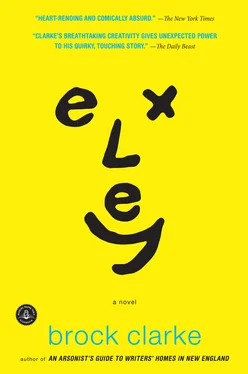“I don’t know,” I said. I looked around the room for a clock but I didn’t see one. When I looked back at my dad, his eyes were still closed, but there was a slight, sleepy smile on his face.
“It’s time for you to stop holding A Fan’s Notes and start reading it to me,” he said. “I know you can do that, can’t cha?”
“Sure,” I said, trying to act like it was no big deal, even though my heart was beating so fast I thought I might need one of my dad’s machines to slow it down. I opened the book. I skipped all the early pages that aren’t numbered and so aren’t really part of the book and went to page 1. I read the title of chapter 1 — “The Nervous Light of Sunday” — to myself, and then the first sentence out loud to my dad: “ ‘On Sunday, the eleventh of November, 196–, while sitting at the bar of the New Parrot Restaurant in my home town, Watertown, New York. ’ ”
Before I go any further, I should say this: you might not know that Exley’s book had Watertown in it, but I did, just like I knew it had swearing and drinking and sex and crazy people and insane asylums and electroshock therapy and insulin shock therapy and misogyny and football and English teachers in it, too. I knew all this even though I hadn’t actually read the book. And how did I come to know that?
Mother Told Me
Mother told me. This happened when I was only eight years old. We were in our living room. The living room was also my dad’s study. I mean, it was a normal living room — it had a couch and a couple of comfortable chairs and they were pointing toward a television and there was a fireplace that we never used because, as Mother liked to say, “Someone forgot to buy the wood,” and, as my dad liked to say, “For Christ’s sake, you don’t buy wood, you chop it,” and, as Mother liked to say, “I wouldn’t complain if you chopped it instead of buying it,” and, as my dad liked to say, getting up from the couch and looking under the cushions, “Jesus H. Keeriiisst, who stole my ax?” — but my dad also had a desk in the corner. When he read at his desk, he sat on the window seat behind it. The window seat opened. But not, of course, when my dad was sitting on it.
Anyway, I was standing in the middle of the room, holding the book I was supposed to read for school. I was in the seventh-grade advanced reading class, but everyone else in my grade was reading the book, too. Usually, there weren’t enough copies of books to go around, and so we had to share or get a copy from the library or buy our own. But this was part of a special government program called America on the Same Page (there was a sticker on the book that said so) and so we each had our own copy. On the front cover of the book was a picture of a boy with ragged short pants and no shoes, wearing a straw hat and standing in a field by himself with the sun setting behind him. Mother asked if she could see the book. I handed it to her. She looked at the front cover and then the back, then smiled at me and handed me back the book. “It looks like an interesting book,” she said.
“It looks like a book for kids,” my dad said. He’d already looked at it and announced I shouldn’t have to read it, which was why we were even having this discussion.
“Miller is a kid,” Mother said. “He’s only eight years old.”
“For Christ’s sake,” my dad said, “I know how old he is.” He took the book out of my hands again and read out loud from the back cover: “‘A contemporary classic about an innocent child making his way through the complicated world of adults.’” His voice sounded high and funny, the way your voice sounds when you hold your nose while talking, although my dad wasn’t holding his nose when he read from the back of the book. He handed the book back to me and said to Mother, in his normal deeper voice, “It’s a book for kids, Carrie. Miller doesn’t have to read kids’ books anymore.”
“Just because you say he doesn’t have to doesn’t mean he shouldn’t. He’s only eight years old, ” my mother said again. She was a lawyer and knew that when you had a good point, you made it better by repeating it.
“For Christ’s sake,” my dad said, “I know how old he is.” Then he looked at me with big eyes. He looked at me this way a lot. Like he wanted my help. Mother saw the look, and I think it made her even madder, because she said, “I don’t think you do.” And then, while they had an argument about whether my dad knew how old I was, I stood between them and read the book. The last book I’d read was Waiting for Godot . That book was a play, and like Mother, the two guys in it tended to repeat themselves — not to make a point but to show that there wasn’t one. This book was a novel, about a good boy with a good family who lived on the outskirts of a good town and owned a good farm with good land and grew good food and led a good life even though the boy missed his good dad, who had died of a bad heart before he could see his good son grow up to become a good man and go off to fight in a good war.
“Dad, I’m done,” I said, handing him the book. I should explain something. It’s not just that I can read anything. It’s that I can read anything fast . This is why I’ve skipped grades. That’s why I was in seventh grade when I was eight years old, in eighth grade when I was nine. Some people thought I was a genius. But I wasn’t. I could just read things I wasn’t supposed to be able to read, faster than most people were supposed to be able to read them.
“Already?” my dad said.
I shrugged and said, “It was pretty easy.”
My dad looked at Mother and smiled at her in an I-told-you-it-was-a-kids’-book sort of way. She didn’t smile back; she almost never smiled or frowned. When she was happy, Mother crossed her arms over her chest. When she was unhappy, she put her hands on her hips. Right then, her hands were on her hips. That should have told my dad everything he needed to know. But my dad never seemed to be able to read Mother: he was always looking at her face, which told him nothing, not at her arms, which would have told him everything. My dad found Mother inscrutable; I knew this because he often said to her, “Carrie, you’re inscrutable.” But she wasn’t: she was absolutely scrutable, as long as you knew the right part of her to scrutinize.
Anyway, Mother’s hands were on her hips, but my dad wasn’t looking at her. He was looking in the direction of his desk. “You know what you should be reading at that school of yours.,” he said. He walked over, reached down, picked a book off his desk, walked back to where I was standing, and handed me the book. I had time to read the title — A Fan’s Notes — before Mother snatched it out of my hands.
“Absolutely not,” she said.
“Why not?” I asked. My dad looked away from her and didn’t say anything. Maybe because he already knew why not.
“You know why not?” Mother said. She wasn’t looking at me when she said this. She was looking at my dad. “Because of all the swearing and drinking and sex and crazy people and insane asylums and electroshock therapy and insulin shock therapy and misogyny and football and English teachers and. ”
That “and” hung there for a while, like a promise of something worse to come. “. Watertown, ” Mother finally said. Like I said earlier, I was born in Watertown. My dad was born in Utica, which is in upstate New York and, according to my dad, just like Watertown except not as far north and so not as great. But Mother was from Portsmouth, Rhode Island. I haven’t been there, but she always said it was beautiful. Maybe that’s the problem with being someplace beautiful: it makes it impossible to live anywhere else that’s not. Because Mother had a tough time living in Watertown, where she’d come to work as a lawyer for a soldiers’ spouses’ advocacy group, met my dad, had me, and never left. Whenever she said the name “Watertown,” it sounded like what a dog would sound like when it said the word “cat.” In any case, I put my head down — you put your head down when your parents talk like this — and waited for whatever Mother would say after “Watertown.” But she didn’t say anything. After a good bit of silence, I heard someone’s footsteps leading away from the living room, and a second after that, I heard the front door slam. I looked up. Mother was gone and my dad was standing there by himself, holding the book, looking sheepish and a little scared. My dad was a big guy. His forearms were thick, hairy, sun-spotted logs. But he was sensitive, too, like a bear with hurt feelings. After Mother left the room, I wanted to hold his hand and tell him everything would be OK.
Читать дальше












